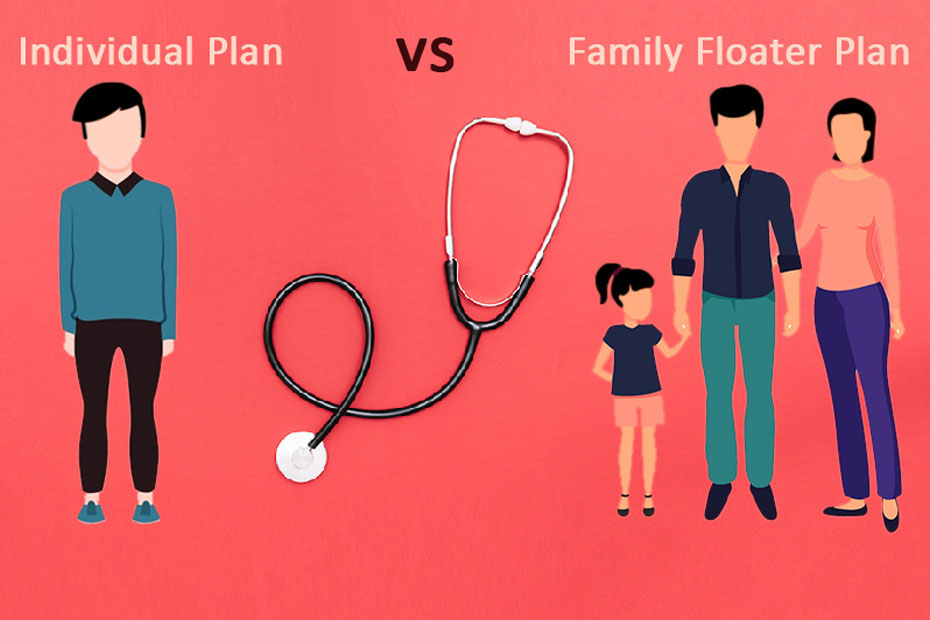Choosing the right health insurance policy is a crucial step in ensuring that you and your loved ones are financially protected in case of medical emergencies. When it comes to selecting a plan, you’ll likely face a common dilemma: should you opt for a family health insurance plan or go for individual health insurance policies? Both options come with their own set of benefits, and understanding their cost implications is key to making an informed decision. So, go ahead and understand what is family insurance vs individual.
Understanding Individual Health Insurance Plans for Family
Individual health insurance policies are curated to provide coverage for a single person. These policies offer a dedicated sum insured, meaning that each policyholder has their own separate coverage.
Cost Factors
The cost of individual health insurance is largely determined by factors like the person’s age, location, and medical history. Younger, healthier individuals generally pay lower premiums, while older adults may face higher costs due to increased risk.
For example, a 30-year-old individual may pay a significantly lower premium than someone aged 60. On the flip side, if a family consists of multiple members across different age groups, buying separate individual policies for each member may end up being more expensive than opting for a family health insurance plan.
Ideal For
- Individuals who want standalone coverage.
- Those with specific medical conditions who need a higher sum insured.
- People who don’t have dependents or prefer separate policies for each family member.
Understanding Family Health Insurance Plans
Family health insurance plans (also called family floater plans) are designed to cover all members of the family under a single policy. The sum insured is shared among all the covered members, which often includes the policyholder, spouse, and children. Some policies may also allow coverage for parents and in-laws.
Cost Factors:
The age of the eldest family member determines the premium for a family health insurance plan. For instance, if a family consists of a 45-year-old parent and two children aged 10 and 14, the premium will be calculated based on the 45-year-old’s age. While family plans are generally more affordable than multiple individual policies, they can become expensive if the eldest family member falls into a higher age bracket or has pre-existing medical conditions.
Ideal For:
- Families looking for affordable, comprehensive coverage under one policy.
- Young, healthy families where the risk of major medical expenses is low.
- Families seeking ease of management with one premium and one policy.
- Cost Comparison: Family vs. Individual Health Insurance
Which One to Choose: Family or Individual Health Insurance?
The decision between opting for an individual health insurance policy or a family health insurance plan depends on a few key factors, including the age of family members, existing health conditions, and budget constraints.
Choose Individual Health Insurance If:
- You are an individual or couple without dependents.
- You or your spouse have pre-existing conditions that require higher sums insured.
- You prefer having dedicated coverage for each family member to ensure their medical needs are always fully covered.
Choose a Family Health Insurance Plan If:
- You’re a young family with dependents and relatively low medical needs.
- You want an affordable option that covers all family members under a single policy.
- Managing multiple policies and premiums seems cumbersome, and you prefer the convenience of a single policy.
Top Tips for Choosing the Best Medical Insurance Policy
Whether you’re leaning towards a family floater plan or individual policies, here are a few tips to help you find the best medical insurance policy:
Assess Your Family’s Health Needs
If you have young children and relatively low medical needs, a family health insurance plan could be more cost-effective. For families with older adults or specific health concerns, individual policies may offer better long-term coverage.
Look for Comprehensive Coverage
Compare policies that offer coverage for various treatments, including hospitalisation, critical illness, maternity benefits, and outpatient services. Some medical insurance plans may also cover day-care treatments and wellness services.
Consider Add-Ons
Add-on covers like critical illness, accident riders, or maternity benefits can enhance your coverage without significantly increasing premiums. Be sure to evaluate the add-ons based on your family’s specific needs.
Check for No Claim Bonus (NCB)
Many health insurance providers offer a no claim bonus if no claims are made during the policy year. This bonus increases the sum insured without increasing the premium, offering extra value.
Conclusion
Choosing between individual health insurance and a family health insurance plan can be challenging, but it ultimately comes down to your family’s specific health needs and budget. Family floater plans are ideal for young, healthy families looking for affordable coverage, while individual health insurance policies provide better security for those with higher medical risks or specific coverage requirements.
Take the time to compare policies and consider the long-term costs to ensure you select the best medical insurance policy that meets your current and future healthcare needs.
